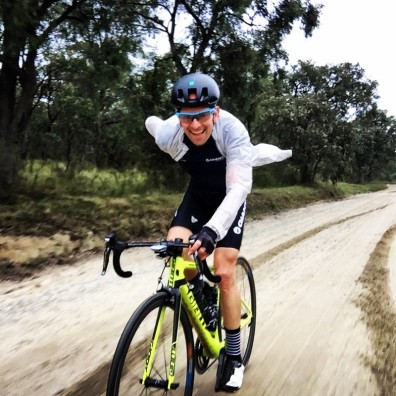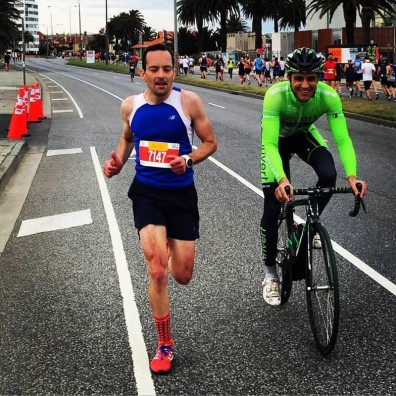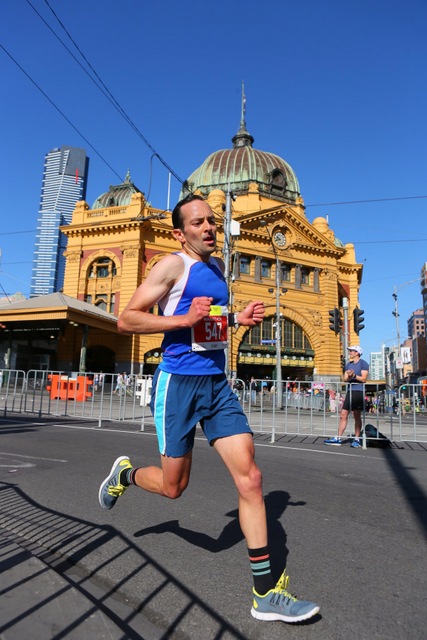Danny Cohen is a busy 40-year-old office worker and experienced road cyclist who started running marathons three years ago. At last year’s windswept Melbourne Marathon in October Danny ran 2 hours 46 minutes 48 seconds.
What makes Danny’s result so incredible is that an MRI report diagnosed a significant hamstring tear just 6-weeks out from the event. This explained the constant ache he had been feeling in his leg when running and for many people, this kind of news would have ended their marathon campaign. But Danny isn’t like most people…
Danny immediately focused on a plan to rehabilitate and manage the injury in time for the event. The ability for elite athletes to recover from major injuries like this so close to a competition is not uncommon. They are good at utilising their support team to devise a recovery plan and then sticking to it.
“Everyone spends time in the injury box. Now it’s your turn, next time it will be someone else’s, but we all do our time.”

Three years ago Danny suffered a significant injury to his shoulder after a cycling crash. Unable to ride during his recovery, he began walking at Albert Park and began to notice a lot of people running. Thinking this might be something he’d like to try, he initially began with the modest goal of running 10km in 40 minutes. But just like with his cycling, Danny would need to find a bigger challenge, both physically and mentally. Once he got the taste for running, he entered a few half-marathons and was soon lured by the majesty of the marathon.
In 2015, just two years on from his shoulder injury, Danny ran a 2:46 Gold Coast Marathon followed by a 2:56 Melbourne Marathon. He then managed a 2:46 at Melbourne last year in very trying conditions.
This remarkable result was not achieved easily. Danny had a tear in his hamstring that he carried through a lot of his training. He presented to MOSIC and worked closely with Osteopaths and Exercise Rehab practitioners to devise a recovery plan that allowed him to keep running while building strength and reducing pain in the affected muscle.
Danny’s coach, Clint Perret, minimised unnecessary load on the hamstring by reducing his mileage. While a large volume of training is an important part of any marathon training campaign, it is also, not surprisingly, associated with increased injury rates. Danny’s training was reduced to include only the key quality sessions at or above race pace, sacrificing most of the excess junk miles that may have overloaded the hamstring. He made up the extra cardiovascular fitness requirement through cycling and a tailored 20 minute strength program 3-4 times per week.
Danny was meticulous in sticking to his strength and running program despite the ongoing temptation to run the extra distance that most other marathon athletes were doing. He trusted that his plan and professional health team would deliver him injury-free and ready to race well on the day. The fact that he managed to run a 2:46 in very windy conditions proved he was right.
“All of the hopes and dreams, all of the support and advice, all of the injury and inconvenience are part of the marathon battle. It’s about the journey to the start line as much as the event itself.”
Although an incredibly positive attitude like this is somewhat intrinsic to people like Danny, there are definitely aspects that can be learned, practiced and integrated by anybody looking for a way to overcome adversity. Here are a few tips:
- Remember how well you’ve done up to that point and don’t let it be for nothing.
- Remain optimistic about a return to full capacity.
- Use your support network to set a thorough recovery plan and goals.
- Trust your plan, revise it and follow it.
- Give your body the best chance to recover by resting a lot and eating well. Danny’s favourite cheat food is what he likes to call ‘nature’s chocolate’ – the apple.
If you would like to speak to Dr Brendan O’Loughlin or one of our other practitioners about your injuries, training plan, goals or any other issue, please feel free to ask a question, contact us or email us at: info@


